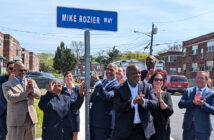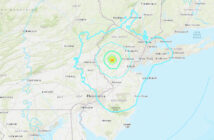Facing the cost of millions of dollars in infrastructure improvements to an aged water and sewer system, borough leaders are looking to sell.
By Matt Skoufalos
This week, Haddonfield Commissioners approved an ordinance to sell off the borough water and sewer infrastructure to New Jersey American Water, a management company headquartered in Voorhees, NJ, and the highest bidder for the utilities, at $28.5 million.
The measure will now head to the local ballot this November, with Haddonfield residents deciding the fate of their public utility by referendum. Significant discussion is expected in the months to follow, the first of which occurred during a public information session Wednesday night.

Haddonfield residents gathered to hear a presentation from New Jersey American Water representatives on the proposed sale of the town water and sewer infrastructure Wednesday. Credit: Matt Skoufalos.
‘A conversation with our residents’
Last week, Haddonfield Mayor Jeffrey Kasko told NJ Pen that he had “mixed feelings” about the proposed sale, despite eventually voting for the ordinance that would put it on the ballot in November.
“I think most people don’t even think about the water that you use in your house, your shower, your sink,” he said.
“Most of us take it for granted that it’s always going to be there and it’s always going to be cheap. It might not be in the future.
But Kasko said that Haddonfield has “enormous infrastructure challenges” that would be financially difficult to address “as just one small town.
“A private operator like [New Jersey American Water] could spread the cost of things out,” he said.
Even were the borough to keep the water and sewer system and outsource management of it, the commissioners say Haddonfield will spend another $48 million by 2034 to maintain it.
That’s in addition to some $14 million the borough still owes for repairs to the infrastructure.
“In the oldest parts of town, you have pipes that are literally 100 years old,” Kasko said; “old terracotta clay pipes that break and have tree roots in them. We even have instances where a sewer pipe cuts into a water pipe. Fifty or so years ago when they came upon that, they just did that kind of stuff.
“Luckily and thankfully we haven’t had any major issues with breakage and flooding, but it could happen,” he said.
Kasko added that he “was a little surprised” at the sum of the bid from New Jersey American Water, which he said “more than covers the debt that we have on the water and sewer, which is the main thing financially that I’m concerned about.
“Now we have to have a conversation with our residents and see if that’s the best thing.”

Jim Walsh, Director of New Jersey Food and Water Watch, cautioned residents that the sale of their public utilities could have unintended consequences. Credit: Matt Skoufalos.
Aging infrastructure, deferred investments
Emily Reuman, a community organizer with New Jersey Food and Water Watch, said that Haddonfield’s is not a unique situation: the impact of deferred investments in public infrastructure compounds over time.
“All across the United States, when we were building water systems, we were willing to make public investment,” Reuman said.
“Since that time, water systems across the country are reaching that age where you either made the investments along the way to protect your system or you didn’t.
“Haddonfield is not unique in this,” she said. “Municipalities are faced with the same thing every time, and nobody wants to spend the money. They’d rather spend it on other projects, and then the pressure’s on.”
Reuman said that just as large corporations like New Jersey American Water can create economies of scale and decrease their costs by operating in multiple systems, municipalities can leverage the same benefits through public-public partnerships and shared service agreements.
“Privatization tends to means a loss of water jobs,” Reuman said. “They cut water jobs, but they have the same or more work to be done. You end up with maintenance backlogs, sewage overflows, [and]a higher rate of water loss.”
(At the information session Wednesday, Carmen Tierno, Senior Director of Delaware Operations for New Jersey American Water, told the room, “We’re going to be looking at current employees and whether they’re a good fit for us, and whether we’re a good fit for them.” Haddonfield Commissioner of Public Works John Moscatelli said there could be “potential staffing corrections” if the sale goes through.)
Finally, Reuman said, as the commoditization of water access can even become a human rights issue.
“All around the world, we’re seeing multinational corporations buying up water supplies, buying up water systems,” Reuman said. “Water turns from a human right into the right for profit.
“In the long run, for the financial integrity of Haddonfield, you don’t want to pass off these major public assets,” she said.
“This isn’t a one-way street. There are other ways to pull up the finances.”
In a 2010 study, Food and Water Watch claimed that in the 14 largest community water systems in New Jersey, “privately run systems charge households 64 percent more than municipal systems charge,” up to an extra $153 annually for a household that uses 5,000 gallons a year.

Representatives from New Jersey American Water addressed Haddonfield residents about the proposal to purchase their water and sewer system on Wednesday. Carmen Tierno (right) said there could be staffing changes as a result of the sale. Credit: Matt Skoufalos.
Local control
Jim Walsh, Director of New Jersey Food and Water Watch, told attendees that offloading public works services to private industry has affected municipal budgets beyond the area of water management.
Walsh cited increased rates for snow removal services or leaf collection as examples of expensively outsourced jobs that used to be done by borough employees in many towns.
Rate increases for water service are also soon to follow after any sale as companies move to recoup their investments, he said.
“Private water companies pay much more for financing costs,” Walsh said. “When your community pays off that debt, you’re replacing low-level debt with bigger water bills down the road.”
Furthermore, Walsh said, surrendering local control of the borough water infrastructure means that the New Jersey Board of Public Utilities (BPU) would decide whether a company like New Jersey American Water would be allowed to raise its rates, and by how much.
That’s a departure from local residents being able to demand transparency from their elected officials over such issues, he said.
“The vote is there to protect you as residents,” Walsh said. “Public records laws don’t apply to [private]companies.”
“The town can manage the system and manage it effectively,” he said. Borough commissioners should “take responsibility for the mess they’re in instead of washing their hands of it.”

Haddonfield resident Deirdre Benjamin, a DEP employee, called the potential sale ‘a tragedy of the commons,’ and encouraged the town to vote against it. Credit: Matt Skoufalos.
‘A liability issue’
Commissioner of Public Works John Moscatelli, one of the architects of the planned sale, said that when considering both Haddonfield’s finances and the stewardship of its resources, “I don’t think it’s close.
“We would be better off as a community with a professional corporation providing these services,” Moscatelli said.
“It’s in the best interest of a company with a profit motive to make sure the system works.”
Haddonfield hasn’t made an effort to “recapitalize” its water systems until the past half-decade, Moscatelli said, and as a result, has been left with “a liability issue.
“The issue is borrowing, and New Jersey American Water doesn’t need to borrow,” Moscatelli said.
He suggested that some of the aging Haddonfield water and sewer infrastructure would no longer be needed after a sale.
“They don’t need our water treatment plants, our wells, our standpipes,” Moscatelli said.
With private management, Moscatelli also said that local water rates for Haddonfield will be comparable, if not cheaper than its existing rates, based on 35-year projections that include the cost of additional millions in municipal bonding for the necessary repairs. Those figures were not immediately available.
‘The price of water is going up’
But Peter Eschbach, Director for Communications and External Affairs for New Jersey American Water, said that his company couldn’t offer any projections on future water rates for Haddonfield.
Complicating the matter is the fact that Haddonfield switched over to a tiered, usage-based water and sewer system earlier this year, even as it enacted a 25 percent rate hike.
“The price of water is going up whether you’re a municipality or something else,” Eschbach said. He added that water rates in New Jersey are “heavily regulated” and “reflect the true cost of service.”
“Our general goal is to have everybody in the state paying the same for water service,” he said.
Eschbach said that in general, after the three-year grace period, the average New Jersey American Water customer pays $52 per month for service.
But he added that raising utility rates is a lengthy process “almost like a court case, with public hearings.
“It takes nine to 18 months to put an increase through,” Eschbach said, “and then maybe another six months to implement it.”
Although providers are not allowed to recover the cost of their capital investment until the system is in service, Eschbach couldn’t say specifically which system improvements would be undertaken after a sale. The company has identified the Euclid Avenue pump station and a broken, exposed sewer line near Wedgwood Swim Club as top priorities, he said.
Haddonfield would be a valuable strategic acquisition for the company, he said, which owns water delivery systems “in a horseshoe around [it].
“Haddonfield is a great connection for us,” Eschbach said.
‘A tragedy of the commons’
Haddonfield residents came down on both sides of the issue, with many remarks in favor of the proposal delivered by those who served on the task force that sent the project out for bid.
Foremost among them was former Haddonfield Mayor Jack Tarditi, who said the borough government had explored the possibility of selling off its water system in 2003, but eventually dismissed that idea when the highest bid returned was $6.7 million.
“I know the situation is much different now,” Tarditi said. He nonetheless called the $28.5-million bid from New Jersey American Water “a very pleasant surprise.”
Tarditi said the current Haddonfield water infrastructure is “a time bomb,” and that those concerned by potential rate increases should know that “the new president of BPU lives on Estaugh Avenue.”
Other long-term residents did not share Tarditi’s assessment.
“It sounds like what you’re doing is taking a problem that had been the town’s and the citizens’ and making it the citizens’,” said Peyton Avenue resident Maureen Kelly.
“I feel like there’s a lot of information missing.”
Deirdre Benjamin, a Wayne Avenue resident who works for the New Jersey Department of Environmental Protection, said that privatizing the borough water infrastructure would make it contingent upon “the moral compass of the company that takes it over.
“I truly know that water costs a lot of money,” Benjamin said. “Water in the future is going to be five, six times the cost it is today.
“[But] if we’re going to pay whatever the bill is, pay it here,” she said. “This is a total tragedy of the commons.”



